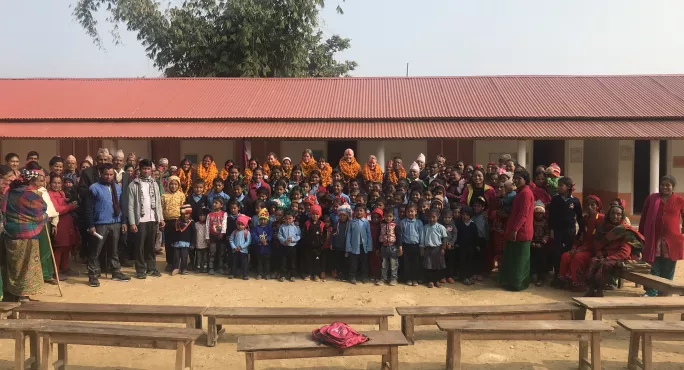Why international schools should go out into the world

The kind of trips that my students are used to are economics trips to Japan or geography trips to Iceland.
So, a bumpy eight-hour bus ride on crumbling roads from Kathmandu to Gulmi district in remote Nepal in 2019 was quite an eye-opener.
Looking out of the bus, they could see how challenging life is for the children who live there. Most of the families’ farm cardamom and beans, and children are needed in the fields to work with their parents.
Landslides and flooding occur, and the terrain is unbelievably inaccessible. It all looked so different from what they are used to, and it wasn’t a photo - they could see that this was real, that these are people’s lives.
International school partnerships offering real-world experience
And my students knew that they weren’t there as tourists - they are closely involved in creating a school there and giving children living in one of the most remote parts of the world a chance to get an education, for the very first time.
The school is called UWS Jaisithok and opened in 2019. It’s part of an effort by United World Schools (UWS) to partner UK and international schools with villages in remote areas of Asia, to bring education to children.
At Dubai College we’ve supported the full school build costs and provided running costs every year since it opened, covering the teacher salaries, the training and development of the community teachers and all costs associated with running the school.
Building together
What’s great about this project is that after five to seven years, when the school is established, the school will gradually transition into government ownership so the community can continue to transform itself for generations to come. This makes the UWS model truly sustainable and puts the local community at the heart.
It’s been a brilliant opportunity for my students - to actually build a school and see it grow. For our pupils, being at an excellent school, with every educational opportunity imaginable, I think it brought home their own privilege and celebrated the idea of gratitude.
The eight students on the trip planned and took English lessons and did some art and drama activities using animal masks they made. They had a chance to really get to know some of the pupils and families, visited them in homes, and said how much they liked meeting Nepalis in their own country.
A real impact
And the community made them feel so welcome and special; they were given garlands, endless cups of masala tea. Mothers gave them hugs and promised the students that they would send their daughters to school, a significant promise with 130 million girls worldwide still missing out on school. They all seemed to think it was a miracle that this was actually happening.
After all, for the children of Gulmi district of Nepal, the alternative may be young boys growing old before their time working on farms and young girls forced into early marriage.
We haven’t been able to visit Jaisithok in the past year, due to Covid-19, but we are still supporting from afar and receiving reports. Our committee of sixth-form students is busy spreading awareness about the impact in Nepal through posters and tweets.
Together we’ve just organised “The Journey to Jaisithok Challenge” as part of UWS’ Happily Ever Smarter campaign. Anyone can run, skip, jump, swim, hop, cartwheel, backflip or cycle a portion of 7,412 kilometres -the distance from Dubai to Jaisithok. The students are just as enthusiastic as ever, which has been wonderful to see.
How to build global connections
Here are five pieces of advice to other schools wanting to do something similar:
- Think about the level of school partnership you’d like, from twinning with an existing school to building a brand new school.
- Generate interest amongst your students by finding something that really speaks to them. There are loads of schools’ resources available to help your students become global citizens and bring the issues alive.
- Brainstorm some creative fundraising ideas. Many charities have ready-made packs that can help, but pupils often come up with the most quirky ones!
- Organise a two-way flow of information between the schools, to give the personal touch. Pupils love to hear the names of their counterparts and about their daily lives.
- Report back on any trips and the impact of the partnership. I found it inspiring to know that we’d helped to buy even little things like a coat rack for a UWS school.
Our students now know first-hand that building a school in an area like this is a lifeline. They love the sense of connection, but it’s more than that.
We feel that we are standing shoulder to shoulder with the entire village. I think that’s what has galvanised our pupils to do so much.
Rupal Shah is a teacher at Dubai College in the UAE
The UK government is doubling all donations to UWS until 29 July, as part of its Aid Match campaign. Find out more about partnering a school and supporting the Happily Ever Smarter campaign with United World Schools here
You need a Tes subscription to read this article
Subscribe now to read this article and get other subscriber-only content:
- Unlimited access to all Tes magazine content
- Exclusive subscriber-only stories
- Award-winning email newsletters
Already a subscriber? Log in
You need a subscription to read this article
Subscribe now to read this article and get other subscriber-only content, including:
- Unlimited access to all Tes magazine content
- Exclusive subscriber-only stories
- Award-winning email newsletters